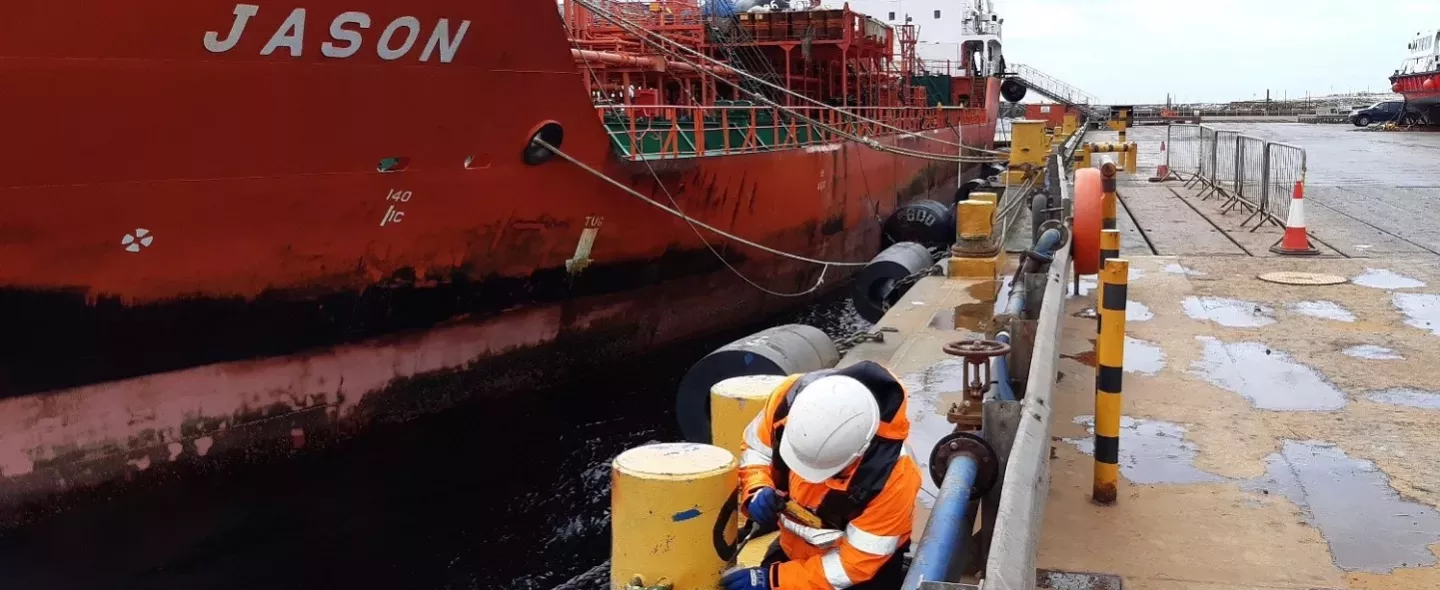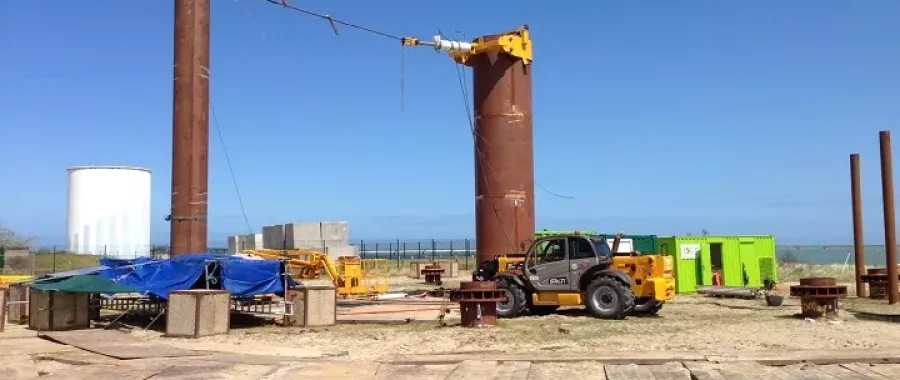In April 2020, the Falkland Islands Government commissioned the design of a new port facility in Stanley Harbour. Work originally commenced on the project the following August, with the overall aim of the works to completely replace the existing port with a brand new facility that would benefit the fishing, tourism and shipping sectors.
Summary of Works
Client: Falkland Islands Government
Start date: August 2021
End date: Ongoing

Case Study
FIPASS – a brief history

The original port facility has served as a vital element of national infrastructure on the Falkland Islands, with its installation dating all the way back to the 1980s. The original reason behind its construction was a result of the facility that was previously in place being unable to cope with the increasing volumes of cargo being imported onto the island. This caused a large bottleneck, with ships unable to unload and depart in a sufficient timeframe.
The original Falkland Island Intermediate Port and Storage System (FIPASS) comprised six oil rig support barges which were shipped over, connected together and linked to the shore via a 600-foot causeway. This was designed to resolve a number of logistics-related issues, such as access, space and accommodation facilities, as well as reducing excessive shipping-related costs. It is this original structure that is in the process of being decommissioned, with SOCOTEC called upon to ensure that the works could be carried out in a safe and compliant manner.
The original port facility has served as a vital element of national infrastructure on the Falkland Islands, with its installation dating all the way back to the 1980s. The original reason behind its construction was a result of the facility that was previously in place being unable to cope with the increasing volumes of cargo being imported onto the island. This caused a large bottleneck, with ships unable to unload and depart in a sufficient timeframe.
The original Falkland Island Intermediate Port and Storage System (FIPASS) comprised six oil rig support barges which were shipped over, connected together and linked to the shore via a 600-foot causeway. This was designed to resolve a number of logistics-related issues, such as access, space and accommodation facilities, as well as reducing excessive shipping-related costs. It is this original structure that is in the process of being decommissioned, with SOCOTEC called upon to ensure that the works could be carried out in a safe and compliant manner.
Asbestos and hazardous materials management
Working on behalf of a major civil engineering contractor, BAM Nuttall, the involvement of SOCOTEC’s Environment & Safety division in the new port project involved the provision of asbestos management and hazardous materials surveys. To support the development of the new facility, SOCOTEC’s Asbestos and Hazardous Materials teams undertook surveys of materials within the existing structures, which involved working in confined spaces and over water.
The purpose of these surveys was to assess the risk from asbestos and other hazardous materials prior to the deconstruction of the existing port facility. Samples were collected and shipped over to the UK to be analysed at SOCOTEC’s Advanced Chemistry and Asbestos laboratories. Furthermore, SOCOTEC’s Asbestos and Hazardous materials teams liaised closely with key stakeholders – including the port management contractor and the principal building contractor – to ensure that all necessary health and safety measures were in place and that the surveys could proceed safely.
The findings from these surveys would better inform the development of the new port, which would increase the efficiency of cargo transportation, improve overall capacity and limit downtime in the harbour to ensure the exports and cargo could be dealt with as efficiently as possible. It would also provide vital infrastructure across the islands, supporting the local economy and facilitating economic growth.
Lessening the burden
By combining asbestos management and hazardous materials surveys into a concentrated programme of works, SOCOTEC’s Asbestos and Hazardous Materials teams were able to reduce some of the operational burden for the client. Working as one team ensured that they were able to more effectively access the areas that required surveying, which in turn maintained the efficiency of surrounding port operations. Additional manpower in the form of specially trained staff also meant that the confined space requirements were met without incurring any additional costs to the client.
Moreover, the provision of asbestos management and hazardous surveys is not the first time that SOCOTEC has delivered a series of works as part of the new port facility. SOCOTEC had already formed a positive relationship with the client, having provided marine sediment, chemical and physical testing services for environmental soils and borehole waters to support the surveying works for the first stage of the decommissioning of the old port.
“We are proud to have successfully delivered a range of environmental monitoring and asbestos management services and contribute towards this major project within the Falkland Islands,” said David Gough, managing director, Environment & Safety, SOCOTEC UK. “By assessing the level of risk posed by the decommissioning of the old port, we were able to provide the client with the level of information and reassurance required to safely proceed with the development of the new facility.”
“BAM is proud to be working with the Falkland Islands Government to develop a new port that will support the local economy, including fishing, tourism and shipping, and facilitate for future forecasted economic growth,” added Martin Bellamy, managing director, BAM Nuttall. “We look forward to initially engaging with the key stakeholders and working with the Falkland Islanders to develop such a critical piece of infrastructure.”






